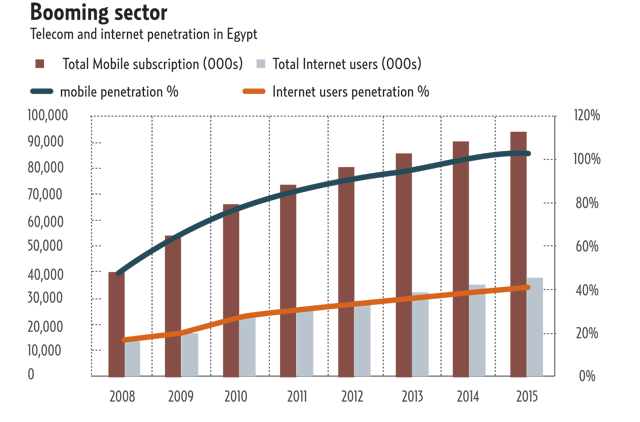
Dubai: The economic impact of shutting down internet access in Egypt for five days resulted in a loss of more than $90 million (Dh330 million), industry experts said.
"The move to ban internet services has resulted in direct costs of around $5 million per day and the ban on mobile services has resulted in more than $14 million in losses while indirect costs have been huge," Hussam Barhoush, Senior Analyst at Pyramid Research, said.
However, this amount does not include the indirect economic impact which resulted in a loss of business in other sectors affected by the shutdown of communication services — e-commerce, tourism and call centres.
According to an OECD [Organisation for Econ-omic Cooperation and Development] report, IT outsourcing firms in Egypt made $1 billion in revenues last year, or around $3 million per working day.
This sector has been a huge contributing factor for the economy and relies heavily on communications and internet networks. The loss of connectivity could make IT firms reconsider overall outsourcing plans. Attracting such firms has been a key strategy of the Egyptian government.
"Social networking tools and telecom services have been used to prepare and organise the protests in Egypt. These developments led the government to ban Facebook and Twitter, followed by a ban on all internet services. But the move raises several crucial questions for the future of the country's information and communications technology industry," Barhoush said.
He said ironically, the government had utilised these same tools for its own benefit. Through Vodafone Egypt, in which it has a 36 per cent ownership stake, the government had sent SMS messages to its people. These messages, which have provoked an outcry from some operators, emphasised the benefits of maintaining the political status quo.
Test case
Egypt is becoming a test case for the internet going dark, with only one of its main service providers, Noor Group, operating.
Noor Group serves most of the government portals and the stock exchange, but it has a small percentage of the market.
Egypt enjoys a relatively strong infrastructure and the ICT industry is far more developed than others in the Arab world.
There are three mobile operators providing services at competitive rates.
All three operators cover about 75 per cent of the country's population. The cellular penetration rate at the end of last year was put at around 78 per cent while the country's fixed-line subscribers stood at 9.4 million or about 11 per cent of the total population. The mobile phone market grew by 20 per cent to 60 million subscribers out of a population of 80 million, on the internet front, the rate of 20.3 million consumers.
Twitter and Facebook could have played a role in the first two days, he said, but now on the streets of Cairo it is people without internet or mobile access who are the majority.
Barhoush said that ADSL services are offered at prices lower than $6 for 256kps speed, which are subsidised and are the cheapest in the Arab region. The illegal neighbourhood networks are ubiquitous despite low internet rates. This has given a tremendous boost to the internet and broadband adoption.
More than 120 companies in Cairo's Smart Valley are impacted by the internet's closure.
Ovum analyst Angel Dobardziev, said that the crisis underlines the political risk of operating in the emerging markets for main players.
"The boom in the communications industry has accelerated the economic growth, so there is no way of reversing the impact it has made on the emerging markets and their people. But as events in Egypt show, the road ahead may be rocky for all, including telecom operators and the people they serve," Dobardziev said. "The country's telecom industry is poised for growth despite short-term crisis. With the need for more and more data usage, social networks will be one of the main drivers of growth in the future," Barhoush said.











